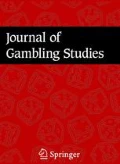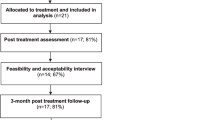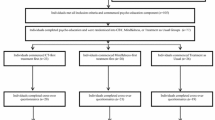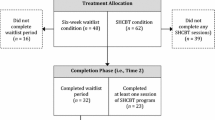Abstract
Very few clinical cognitive-behavioural intervention (CBI) studies were conducted with the Chinese gamblers. There is a lack of attention paid to intervening in negative emotions that may also adversely affect PGs in current CBI treatment modality. This study is the first attempt to systematically and rigorously evaluate both the short-term and longer-term effects of a culturally-attuned CBI group treatment with an emotion regulation component for a group of Chinese PGs in Hong Kong. A quasi-experimental matched-pairs design was adopted and 84 participants were allocated to the CBI (N = 42) and social activity groups (N = 42). There are 3 assessment points in the study: baseline at recruitment, post-intervention at the end of CBI and social activity groups, and at 6-month follow-up. When compared to the social activity group and after controlling for general group effects, there were significantly greater decreases in the severity of gambling, gambling-related cognitions (i.e. interpretive bias), negative psychological states (i.e. stress) and money spent on gambling in the past month in the CBI group between pre- and post-intervention and between pre-intervention and 6-month follow-up. Results also indicated that both reduction in gambling-related cognitions and negative psychological states could mediate the treatment effect of the CBI on the reduction of problematic gambling behaviours. The culturally attuned integrated CBI group treatment with an emotional regulation component appeared to be effective in treating Chinese problem gamblers in Hong Kong and the effects could be sustained at 6-month follow-up.

Similar content being viewed by others
Notes
The term ‘problem gamblers’ will hereafter be used in this paper to cover both problem and pathological gamblers.
References
Ackerman, S. J., & Hilsenroth, M. J. (2003). A review of therapist characteristics and techniques positively impacting the therapeutic alliance. Clinical Psychology Review, 23(1), 1–33. https://doi.org/10.1016/S0272-7358(02)00146-0.
American Psychological Association Presidential Task Force on Evidence-Based Practice. (2006). Evidence-based practice in psychology. American Psychologist, 61, 271–285.
Berking, M., Wupperman, P., Reichardt, A., Pejic, T., Dippel, A., & Znoj, H. (2008). Emotion-regulation skills as a treatment target in psychotherapy. Behaviour Research and Therapy, 46(11), 1230–1237.
Calado, F., & Griffiths, M. D. (2016). Problem gambling worldwide: An update and systematic review of empirical research (2000–2015). Journal of Behavioral Addictions, 5(4), 592–613.
Carroll, K. M., Nich, C., Sifry, R. L., Nuro, K. F., Frankforter, T. L., Ball, S. A., et al. (2000). A general system for evaluating therapist adherence and competence in psychotherapy research in the addictions. Drug and Alcohol Dependence, 57(3), 225–238.
Census and Statistics Department. (2017). Retrieved from http://www.censtatd.gov.hk/home/index_tc_t.jsp. Accessed 1 Aug 2017.
Chan, E. M. L., Dowling, N. A., Jackson, A. C., & Shek, D. T.-L. (2016). Gambling related family coping and the impact of problem gambling on families in Hong Kong. Asian Journal of Gambling Issues and Public Health, 6(1), 1.
Cohen, J. (1988). Statistical power analysis for the behavioral sciences (2nd ed.). Hillsdale: Lawrence Erlbaum Associates.
Cowlishaw, S., Merkouris, S., Dowling, N., Anderson, C., Jackson, A., & Thomas, S. (2012). Psychological therapies for pathological and problem gambling. Cochrane Database of Systematic Reviews. https://doi.org/10.1002/14651858.cd008937.pub2.
Dowling, N., Cowlishaw, S., Jackson, A. C., Merkouris, S. S., Francis, K. L., & Christensen, D. R. (2015). Prevalence of psychiatric co-morbidity in treatment-seeking problem gamblers: A systematic review and meta-analysis. Australian and New Zealand Journal of Psychiatry, 49(6), 519–539. https://doi.org/10.1177/0004867415575774.
Dowling, N., Merkouris, S., Greenwood, C., Oldenhof, E., Toumbourou, J., & Youssef, G. (2017). Early risk and protective factors for problem gambling: A systematic review and meta-analysis of longitudinal studies. Clinical Psychology Review, 51, 109–124.
Dowling, N., Smith, D., & Thomas, T. (2006). Treatment of female pathological gambling: The efficacy of a cognitive-behavioural approach. Journal of Gambling Studies, 22(4), 355–372.
Dowling, N., Smith, D., & Thomas, T. (2009). A preliminary investigation of abstinence and controlled gambling as self-selected goals of treatment for female pathological gambling. Journal of Gambling Studies, 25(2), 201.
Gooding, P., & Tarrier, N. (2009). A systematic review and meta-analysis of cognitive-behavioural interventions to reduce problem gambling: Hedging our bets? Behaviour Research and Therapy, 47(7), 592–607. https://doi.org/10.1016/j.brat.2009.04.002.
Goodwin, R., & Tang, C. S. (1996). Chinese personal relationships. In M. H. Bond (Ed.), The handbook of Chinese psychology (pp. 309–321). Hong Kong: Oxford University Press.
Gueorguieva, R., & Krystal, J. H. (2004). Move over anova: Progress in analyzing repeated-measures data andits reflection in papers published in the archives of general psychiatry. Archives of General Psychiatry, 61(3), 310–317. https://doi.org/10.1001/archpsyc.61.3.310.
Guo, S., Manning, V., Thane, K., Ng, A., Abdin, E., & Wong, K. (2014). Predictors of treatment outcome among Asian pathological gamblers (PGs): Clinical, behavioural, demographic, and treatment process factors. Journal of Gambling Studies, 30(1), 89–103. https://doi.org/10.1007/s10899-012-9328-7.
Huang, L.-S., & Teng, C.-I. (2009). Development of a Chinese superstitious belief scale. Psychological Reports, 104(3), 807–819.
Kendall, P. C., Cummings, C. M., Villabø, M. A., Narayanan, M. K., Treadwell, K., Birmaher, B., et al. (2016). Mediators of change in the child/adolescent anxiety multimodal treatment study. Journal of Consulting and Clinical Psychology, 84(1), 1–14. https://doi.org/10.1037/a0039773.
Lesieur, H. R., & Blume, S. B. (1987). The South Oaks gambling screen (SOGS): A new instrument for the identification of pathological gamblers. American Journal of Psychiatry, 144(9), 1.
Li, X., Tang, H., Guo, F., & He, H. (2012). A review of depression-anxiety-stress scale’s reliability and validity. Chinese Journal of Clinical Psychology, 20(3), 350–352.
Loo, J. M., Raylu, N., & Oei, T. P. (2008). Gambling among the Chinese: A comprehensive review. Clinical Psychology Review, 28(7), 1152–1166.
Lovibond, P. F., & Lovibond, S. H. (1995). The structure of negative emotional states: Comparison of the Depression Anxiety Stress Scales (DASS) with the beck depression and anxiety inventories. Behaviour Research and Therapy, 33(3), 335–343. https://doi.org/10.1016/0005-7967(94)00075-U.
Melville, K. M., Casey, L. M., & Kavanagh, D. J. (2007). Psychological treatment dropout among pathological gamblers. Clinical Psychology Review, 27(8), 944–958.
Merkouris, S., Thomas, S., Browning, C., & Dowling, N. (2016a). Predictors of outcomes of psychological treatments for disordered gambling: A systematic review. Clinical Psychology Review, 48, 7–31.
Merkouris, S., Thomas, A., Shandley, K., Rodda, S., Oldenhof, E., & Dowling, N. (2016b). An update on gender differences in the characteristics associated with problem gambling: A systematic review. Current Addiction Reports, 3(3), 254–267.
Oei, T. P., Lin, J., & Raylu, N. (2007a). Validation of the Chinese version of the Gambling Related Cognitions Scale (GRCS-C). Journal of Gambling Studies, 23(3), 309–322.
Oei, T. P., Lin, J., & Raylu, N. (2007b). Validation of the Chinese version of the Gambling Urges Scale (GUS-C). International Gambling Studies, 7(1), 101–111.
Preacher, K. J., & Hayes, A. F. (2008). Asymptotic and resampling strategies for assessing and comparing indirect effects in multiple mediator models. Behavior Research Methods, 40(3), 879–891. https://doi.org/10.3758/BRM.40.3.879.
Raylu, N., & Oei, T. P. (2002). Pathological gambling: A comprehensive review. Clinical Psychology Review, 22(7), 1009–1061.
Raylu, N., & Oei, T. P. (2004a). The Gambling Related Cognitions Scale (GRCS): Development, confirmatory factor validation and psychometric properties. Addiction, 99(6), 757–769.
Raylu, N., & Oei, T. P. (2004b). The Gambling Urge Scale: Development, confirmatory factor validation, and psychometric properties. Psychology of Addictive Behaviors, 18(2), 100–105.
Sharpe, L. (2002). A reformulated cognitive–behavioral model of problem gambling: A biopsychosocial perspective. Clinical Psychology Review, 22(1), 1–25.
Sterne, J. A. C., White, I. R., Carlin, J. B., Spratt, M., Royston, P., Kenward, M. G., et al. (2009). Multiple imputation for missing data in epidemiological and clinical research: Potential and pitfalls. BMJ. https://doi.org/10.1136/bmj.b2393.
Swift, J. K., & Callahan, J. L. (2009). The impact of client treatment preferences on outcome: A meta-analysis. Journal of Clinical Psychology, 65(4), 368–381. https://doi.org/10.1002/jclp.20553.
Tang, C. S., Wu, A. M. S., Tang, J. Y. C., & Yan, E. C. W. (2010). Reliability, validity, and cut scores of the South Oaks gambling screen (SOGS) for Chinese. Journal of Gambling Studies, 26(1), 145–158. https://doi.org/10.1007/s10899-009-9147-7.
Teo, P., Mythily, S., Anantha, S., & Winslow, M. (2007). Demographic and clinical features of 150 pathological gamblers referred to a community addictions programme. Annals Academy of Medicine Singapore, 36(3), 165.
The Hong Kong Polytechnic University. (2012). The study on Hong Kong people’s participation in gambling activities. Retrieved from http://www.hab.gov.hk/en/publications_and_press_releases/reports.htm. Accessed 1 Aug 2017.
Tracey, T. J., & Kokotovic, A. M. (1989). Factor structure of the working alliance inventory. Psychological Assessment: A Journal of Consulting and Clinical Psychology, 1(3), 207.
Wei, M., & Heppner, P. P. (2005). Counselor and client predictors of the initial working alliance: A replication and extension to Taiwanese client–counselor dyads. The Counseling Psychologist, 33(1), 51–71.
Williams, A. D., Grisham, J. R., Erskine, A., & Cassedy, E. (2012). Deficits in emotion regulation associated with pathological gambling. British Journal of Clinical Psychology, 51(2), 223–238.
Wong, D. F. K., Chung, C. L. P., Wu, J., Tang, J., & Lau, P. (2015). A preliminary study of an integrated and culturally attuned cognitive behavioral group treatment for Chinese problem gamblers in Hong Kong. Journal of Gambling Studies, 31(3), 1015–1027.
Funding
The study was funded by the University Grants Committee (UGC) of Hong Kong (Grant Number 11409114).
Author information
Authors and Affiliations
Corresponding author
Ethics declarations
Conflict of interest
The authors declare that they have no conflict of interest.
Ethical Approval
All procedures performed in studies involving human participants were in accordance with the ethical standards of the institutional and/or national research committee and with the 1964 Helsinki declaration and its later amendments or comparable ethical standards.
Rights and permissions
About this article
Cite this article
Zhuang, X.Y., Wong, D.F.K., Ng, T.K. et al. Evaluating the Effectiveness of an Integrated Cognitive-Behavioural Intervention (CBI) Model for Male Problem Gamblers in Hong Kong: A Matched-Pair Comparison Design. J Gambl Stud 34, 969–985 (2018). https://doi.org/10.1007/s10899-018-9747-1
Published:
Issue Date:
DOI: https://doi.org/10.1007/s10899-018-9747-1




